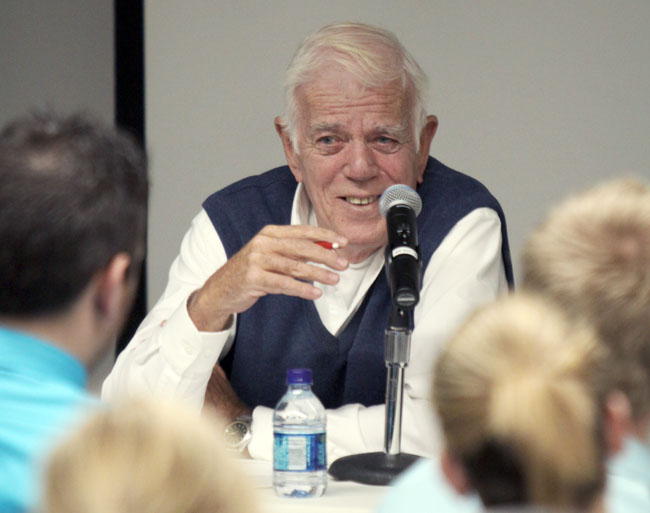William Ball, political science and public administration professor at NMU, and Tom Baldini, former Marquette High School teacher and district director for 1st district congressman Bart Stupak, publicly discussed the outcome of the midterm election during the Monday, Nov. 8 PS 495/595 panel discussion.
David Haynes, assistant political science professor at NMU, began the discussion with an overview of the election results for the Upper Peninsula and the cyclical nature of voting.
“If you look at the U.P., every one of the House seats but one went to Republicans, and both state Senate seats from the U.P. went to Republicans,” Haynes said. “Every one of the House seats that Republicans took have been Republican in the last 20 years at one time or another, and they’ve been Democratic.”

Haynes asked three questions: what will happen, what will change and will nothing change? Haynes then handed the discussion to Ball.
Ball said the state of Michigan government will hopefully improve, because it cannot get worse than it has been. Michigan has had the highest number of jobs leaving the state for eight years.
Ball said, though Republicans were successful in this election, it is not as much a Republican victory as it is anti-incumbent. This means the election results reflect a voter discontent with those in political power.
“If Republicans are half smart, they’re not going to think that the whole country decided that they love Republicans, because I don’t think that’s true,” Ball said. “I did give a talk to two Tea Party rallies this year, and the people were not Republican; they were anti-incumbent, and certainly anti-spending.”
He said when Republicans swept the ‘94 election, they increased debt, not Democrats, and part of their campaign this year was a plea for a second chance.
“Are they really going to do it this time? I’d like to think so. I’d like to think they’re going to keep down the spending and cut out a lot of earmarks, the pork barrel legislation,” Ball said.
He added that one problem with government overspending is the interest citizens must pay on the increasing national debt.
“It never gets paid back. The problem is, we all pay interest on this debt, like, forever. So all your working life, you will be paying interest on the money that’s been borrowed last year or this year,” Ball said.
Ball finished by saying he is not optimistic, but he is happy there will be a change.
“I’m not doing victory laps and all that stuff for Republicans. I think it’s a chance, an opportunity, to turn America around and lower government spending, a little bit less government control, and to free up the American economy again. If it happens, we’ll be fine,” he said.
The discussion turned over to Baldini, who said that one of the problems with this election was the disproportionate number of older people who voted compared to younger people who did not vote.
“Older people are much more prone to be conservative and say, ‘Let’s maintain the status quo,’” Baldini said. “You don’t move forward, whatever ‘forward’ means, … by maintaining the status quo.”
Baldini said that the switch of senior citizens in political allegiance will alter the Republican Party in the future. Programs that used to be supported by Democrats – like Medicare – will now have to be supported by Republicans.
“This is going to be a challenge for both parties – the change in allegiance and the change in alliance of voters,” Baldini said.
Baldini said he agreed with Ball about Republicans running on a theme of a smaller deficit and asking for a second chance.
“When was the last surplus budget? Bill Clinton,” he said. “When was the one previous to that? Lyndon Johnson. Some of the biggest deficits have been run up by Republicans.”
Baldini and Ball agreed that some people’s imprisonment should be reevaluated, perhaps to preserve higher education funding or reduce cuts in the future.
Dylan Shiver, a master’s student pursuing public administration, is optimistic about the state of higher education.
“I have a lot of optimism and think they won’t cut higher education,” Shiver said. “I think prisons are something they’ll take a big look at.”
However, Shiver said if there are cuts to higher education, students have no right to complain because they didn’t vote.
“The unfortunate thing is, the youth didn’t vote and they don’t vote,” Shiver said. “So when you start to cut education, you don’t really have any ground to stand on when you didn’t go out there and voice your concerns saying that you want to protect our lower tuition and you want to protect the funding coming in, to make sure that we get the scholarships and the grants that we need.”

























Martin • Nov 11, 2010 at 3:18 pm
“He said when Republicans swept the ‘94 election, they increased debt, not Democrats, and part of their campaign this year was a plea for a second chance.” –Ball
Actually, Speaker of the House, Newt Gingrich led the drive to balance the budget.
“When was the last surplus budget? Bill Clinton,” he said. “When was the one previous to that? Lyndon Johnson. Some of the biggest deficits have been run up by Republicans.” – Baldini
Again, Clinton followed the leadership of Newt Gingrich to balance the budget. This was a major factor in Clinton’s reelection. Clinton’s economic victory overshadowed failure in Somalia and Bosnia, the Whitewater(gate) scandal, and the Paula Jones case.
When did this massive national debt begin? What did FDR contribute? Didn’t a Republican majority Congress work to pay off WWII debt under Truman and Eisenhower?
It’s about time we hear from someone like Dr. Ball, who at least takes time to give the appearance of objectivity. His assessment seems pragmatic. I question Mr. Baldini’s ability to break rank and file.